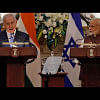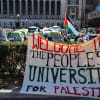US only hurts itself by trying to silence pro-Palestinian protesters

It is disappointing that more than 900 students have been arrested from a number of universities and colleges in the United States over the past two weeks, because they demanded justice for Palestinians. Protesting against Israel's unjust war in Gaza, these students have been demanding that their universities divest from companies and businesses that have links with Israel in any shape or form. They want their educational institutions—and essentially their country—to be separate from Israel's genocidal campaign against Palestinians, and we stand in solidarity with them.
Since the October 7 Hamas attack in Israel, the latter has been running a ruthless campaign in Gaza that has so far killed more than 34,000 people. Although the US, as usual, stood by Israel, its university students wanted no part in it. They have been holding rallies, sit-ins, hunger strikes and, most recently, encampments on their campuses in protest. Things escalated when, on April 18, police removed a pro-Palestinian encampment on the Columbia University campus, arresting over 100 demonstrators. Instead of getting subdued, the students pushed back, and similar demonstrations spread across the US.
Now university administrations and police are cracking down on protesters, with the accusations of anti-Semitism being thrown around to justify it. We fail to understand how a peaceful demonstration demanding justice for a persecuted population can be labelled anti-Semitic. In fact, what these protesters are being subjected to violates the principles of academic freedom and free speech, as the American Civil Liberty Union (ACLU) has pointed out.
The US government should pay heed to the demands of pro-Palestinian protesters. What we have seen so far is an extraordinary display of double standards and flouting of international and humanitarian laws in Gaza, and these students have been trying to bring critical focus on that. The US must re-evaluate its position regarding Israel and take a stance that is moral and in line with international humanitarian laws, not to mention its own stated policy on human rights. Protecting one nation's interests must not be detrimental to another nation's freedom and well-being.


 For all latest news, follow The Daily Star's Google News channel.
For all latest news, follow The Daily Star's Google News channel. 










Comments